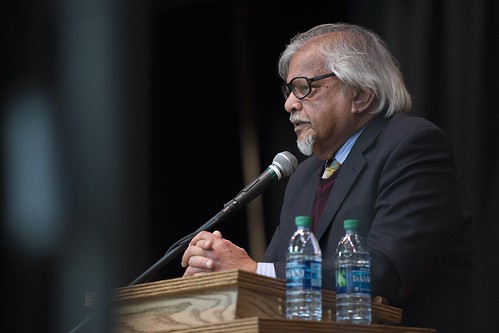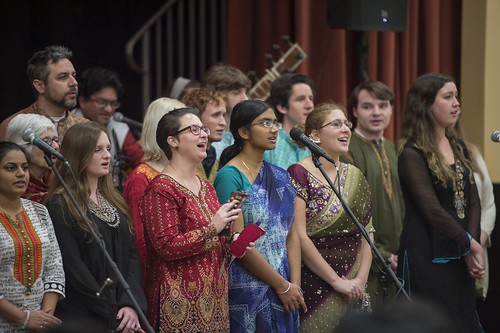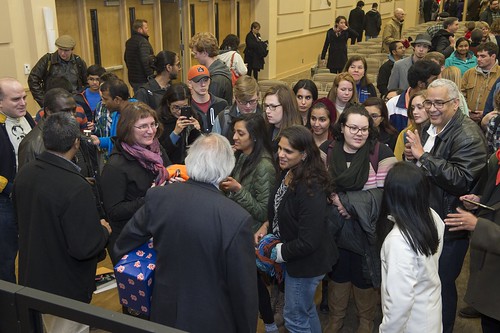Gandhi's grandson spreads message of nonviolence
Article body
"Make your life meaningful. Life is not just about making money and possessing good things. Your life should mean something to the people around you."
Those were the words Arun Gandhi spoke as he shared a message of nonviolence, overcoming anger and the key to a meaningful life during his talk at Auburn University Tuesday, Feb. 9, as part of the Office of International Programs' Year of India celebrations.
Gandhi lived with his grandfather, Mahatma Gandhi, for two years beginning when he was 12 years old. It was during that time with his grandfather that Gandhi learned some of the most important lessons of his life: how to use anger constructively and how to live a nonviolent life in a world filled with violence.
"Those two years really made a very big difference in my life," said Gandhi, whose parents sent him to India to live with his grandfather when they realized he wasn't properly managing his anger after other children attacked him.
"At the age of 10, I was beaten up by some white youths because they thought I was too black and then by some African youths because they thought I was too white," he said. "It filled me with a lot of rage."
His grandfather taught him to manage his feelings by writing an anger journal. In it, he wrote the things that angered him with the intention of finding a solution to the problem.
"[My grandfather] said anger is like electricity," Gandhi recalled. "It's just as useful and just as powerful but only if we use it intelligently. But it can be just as deadly and destructive if we abuse it. Just as we channel electrical energy and bring it into our lives and use it for the good of humanity, we must learn to channel anger in the same way so that we can use that energy for the good of humanity rather than abuse it and cause death and destruction."
The other lesson Gandhi learned from his grandfather was about the types of violence in the world.
"My grandfather was very concerned about this more than a century ago," Gandhi said. "We have progressed civilization since the days of the cavemen. The one thing we haven't changed is the way we resolve conflict. Violence does not really solve any problems at all. It increases the problems and aggravates the problems. We continue to try to solve them with more and more violence. If we continue this way, I don't know where we are going to end up."
Gandhi explained that violence is much more than physical violence. It can also be passive violence – a lesson his grandfather taught him when he threw away a small pencil in hopes of getting a new one. Instead of buying him a new pencil, Gandhi's grandfather made him search for the old pencil and then taught him two valuable lessons.
"The first lesson is that even in the making of the simplest thing like a pencil, we use a lot of the world's natural resources and when we throw them away, we are throwing away the world's natural resources and that is violence against nature," he said. "And the second lesson is that because in an affluent society we can afford to buy all these things in bulk, we overconsume. If we overconsume, we force others to live in poverty and that is violence against humanity."
Gandhi was challenged by his grandfather to make a genealogical tree of violence and use it each day to keep track of acts of physical or passive violence that he committed. His grandfather challenged him to look at the passive violence he committed and ask himself, "If somebody was to do this to me, would I be helped by it or hurt by it?"
That's when his grandfather explained the connection between physical violence and passive violence.
"He said we commit passive violence all the time, every day, consciously and unconsciously. That generates anger in the victim and the victim moves on to physical violence to get justice. So it is passive violence that fuels the fire of physical violence. So logically, if we want to put out that fire of physical violence, we have to cut out the fuel supply. And since the fuel supply comes from each one of us, we have to become the change we wish to see in the world," Gandhi said, using one of his grandfather's famous quotes.
Gandhi said building relationships is an important aspect of nonviolence, and that relationships should be based on the principles of respect, understanding, acceptance and appreciation. He identified two ways to foster those types of relationships: trusteeship and constructive action.
Gandhi explained that we are given talents, but as trustees of the talents, individuals must use talent as much for other people as for themselves.
Constructive action comes from helping others in need, but not in an oppressive way.
"Compassion should not be oppressive," he said. Giving to those in need instead of helping them through their situation oppresses them, instead of helping them out of poverty.
"All the problems in the world today come from poverty," he said. "We have to eradicate poverty. The constructive way to deal with it is to find out why the person is in that situation, what kind of strengths that person has, and make them aware that they can stand on their own feet. That is the constructive way to build self-respect and self-confidence. That is the way in which we can transform this world and make it a better place."
Gandhi said peace will come when individuals transform themselves and the world around them.
"We are here to live a meaningful life so that our life makes a difference in people around us," he said.
Related Media
Media interested in this story can contact Communications Director Preston Sparks at (334) 844-9999 or preston.sparks@auburn.edu.
Auburn University is a nationally ranked land grant institution recognized for its commitment to world-class scholarship, interdisciplinary research with an elite, top-tier Carnegie R1 classification, life-changing outreach with Carnegie’s Community Engagement designation and an undergraduate education experience second to none. Auburn is home to more than 30,000 students, and its faculty and research partners collaborate to develop and deliver meaningful scholarship, science and technology-based advancements that meet pressing regional, national and global needs. Auburn’s commitment to active student engagement, professional success and public/private partnership drives a growing reputation for outreach and extension that delivers broad economic, health and societal impact.







